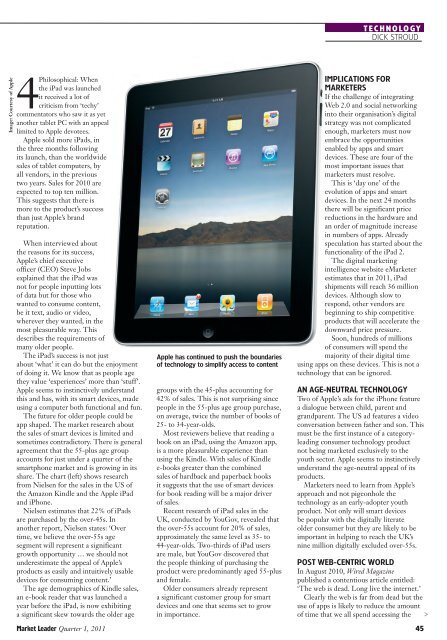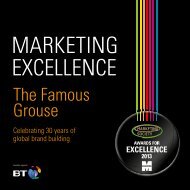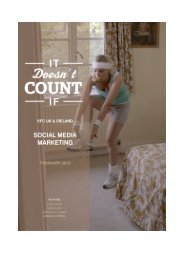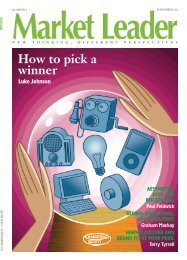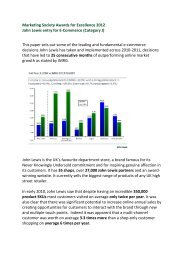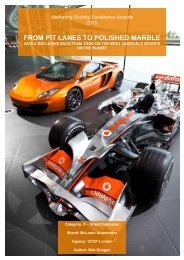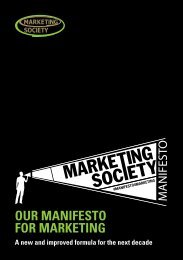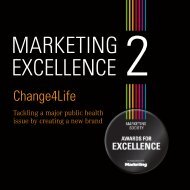MARKET LEADER q1 11 COVER draft 1.indd - The Marketing Society
MARKET LEADER q1 11 COVER draft 1.indd - The Marketing Society
MARKET LEADER q1 11 COVER draft 1.indd - The Marketing Society
You also want an ePaper? Increase the reach of your titles
YUMPU automatically turns print PDFs into web optimized ePapers that Google loves.
t e c h n o lo gy<br />
dick stroud<br />
Image: Courtesy of Apple<br />
4<br />
Philosophical: When<br />
the iPad was launched<br />
it received a lot of<br />
criticism from ‘techy’<br />
commentators who saw it as yet<br />
another tablet PC with an appeal<br />
limited to Apple devotees.<br />
Apple sold more iPads, in<br />
the three months following<br />
its launch, than the worldwide<br />
sales of tablet computers, by<br />
all vendors, in the previous<br />
two years. Sales for 2010 are<br />
expected to top ten million.<br />
This suggests that there is<br />
more to the product’s success<br />
than just Apple’s brand<br />
reputation.<br />
When interviewed about<br />
the reasons for its success,<br />
Apple’s chief executive<br />
officer (CEO) Steve Jobs<br />
explained that the iPad was<br />
not for people inputting lots<br />
of data but for those who<br />
wanted to consume content,<br />
be it text, audio or video,<br />
wherever they wanted, in the<br />
most pleasurable way. This<br />
describes the requirements of<br />
many older people.<br />
<strong>The</strong> iPad’s success is not just<br />
about ‘what’ it can do but the enjoyment<br />
of doing it. We know that as people age<br />
they value ‘experiences’ more than ‘stuff’.<br />
Apple seems to instinctively understand<br />
this and has, with its smart devices, made<br />
using a computer both functional and fun.<br />
<strong>The</strong> future for older people could be<br />
app shaped. <strong>The</strong> market research about<br />
the sales of smart devices is limited and<br />
sometimes contradictory. <strong>The</strong>re is general<br />
agreement that the 55-plus age group<br />
accounts for just under a quarter of the<br />
smartphone market and is growing in its<br />
share. <strong>The</strong> chart (left) shows research<br />
from Nielsen for the sales in the US of<br />
the Amazon Kindle and the Apple iPad<br />
and iPhone.<br />
Nielsen estimates that 22% of iPads<br />
are purchased by the over-45s. In<br />
another report, Nielsen states: ‘Over<br />
time, we believe the over-55s age<br />
segment will represent a significant<br />
growth opportunity … we should not<br />
underestimate the appeal of Apple’s<br />
products as easily and intuitively usable<br />
devices for consuming content.’<br />
<strong>The</strong> age demographics of Kindle sales,<br />
an e-book reader that was launched a<br />
year before the iPad, is now exhibiting<br />
a significant skew towards the older age<br />
Apple has continued to push the boundaries<br />
of technology to simplify access to content<br />
groups with the 45-plus accounting for<br />
42% of sales. This is not surprising since<br />
people in the 55-plus age group purchase,<br />
on average, twice the number of books of<br />
25- to 34-year-olds.<br />
Most reviewers believe that reading a<br />
book on an iPad, using the Amazon app,<br />
is a more pleasurable experience than<br />
using the Kindle. With sales of Kindle<br />
e-books greater than the combined<br />
sales of hardback and paperback books<br />
it suggests that the use of smart devices<br />
for book reading will be a major driver<br />
of sales.<br />
Recent research of iPad sales in the<br />
UK, conducted by YouGov, revealed that<br />
the over-55s account for 20% of sales,<br />
approximately the same level as 35- to<br />
44-year-olds. Two-thirds of iPad users<br />
are male, but YouGov discovered that<br />
the people thinking of purchasing the<br />
product were predominantly aged 55-plus<br />
and female.<br />
Older consumers already represent<br />
a significant customer group for smart<br />
devices and one that seems set to grow<br />
in importance.<br />
Implications for<br />
marketers<br />
If the challenge of integrating<br />
Web 2.0 and social networking<br />
into their organisation’s digital<br />
strategy was not complicated<br />
enough, marketers must now<br />
embrace the opportunities<br />
enabled by apps and smart<br />
devices. <strong>The</strong>se are four of the<br />
most important issues that<br />
marketers must resolve.<br />
This is ‘day one’ of the<br />
evolution of apps and smart<br />
devices. In the next 24 months<br />
there will be significant price<br />
reductions in the hardware and<br />
an order of magnitude increase<br />
in numbers of apps. Already<br />
speculation has started about the<br />
functionality of the iPad 2.<br />
<strong>The</strong> digital marketing<br />
intelligence website eMarketer<br />
estimates that in 20<strong>11</strong>, iPad<br />
shipments will reach 36 million<br />
devices. Although slow to<br />
respond, other vendors are<br />
beginning to ship competitive<br />
products that will accelerate the<br />
downward price pressure.<br />
Soon, hundreds of millions<br />
of consumers will spend the<br />
majority of their digital time<br />
using apps on these devices. This is not a<br />
technology that can be ignored.<br />
An age-neutral technology<br />
Two of Apple’s ads for the iPhone feature<br />
a dialogue between child, parent and<br />
grandparent. <strong>The</strong> US ad features a video<br />
conversation between father and son. This<br />
must be the first instance of a categoryleading<br />
consumer technology product<br />
not being marketed exclusively to the<br />
youth sector. Apple seems to instinctively<br />
understand the age-neutral appeal of its<br />
products.<br />
Marketers need to learn from Apple’s<br />
approach and not pigeonhole the<br />
technology as an early-adopter youth<br />
product. Not only will smart devices<br />
be popular with the digitally literate<br />
older consumer but they are likely to be<br />
important in helping to reach the UK’s<br />
nine million digitally excluded over-55s.<br />
Post Web-centric world<br />
In August 2010, Wired Magazine<br />
published a contentious article entitled:<br />
‘<strong>The</strong> web is dead. Long live the internet.’<br />
Clearly the web is far from dead but the<br />
use of apps is likely to reduce the amount<br />
of time that we all spend accessing the ><br />
Market Leader Quarter 1, 20<strong>11</strong> 45


